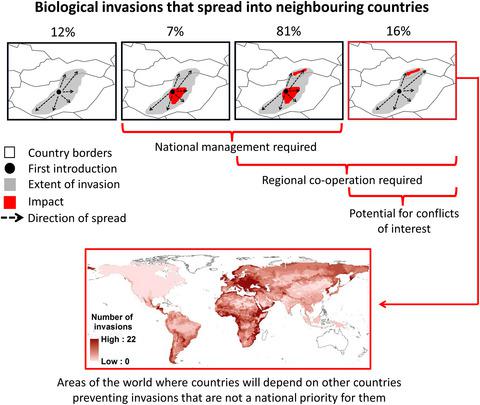当前位置:
X-MOL 学术
›
Glob. Change Biol.
›
论文详情
Our official English website, www.x-mol.net, welcomes your
feedback! (Note: you will need to create a separate account there.)
Stronger regional biosecurity is essential to prevent hundreds of harmful biological invasions.
Global Change Biology ( IF 10.8 ) Pub Date : 2020-01-19 , DOI: 10.1111/gcb.15006 Katelyn T Faulkner 1, 2 , Mark P Robertson 2 , John R U Wilson 1, 3
Global Change Biology ( IF 10.8 ) Pub Date : 2020-01-19 , DOI: 10.1111/gcb.15006 Katelyn T Faulkner 1, 2 , Mark P Robertson 2 , John R U Wilson 1, 3
Affiliation

|
Biological invasions often transcend political boundaries, but the capacity of countries to prevent invasions varies. How this variation in biosecurity affects the invasion risks posed to the countries involved is unclear. We aimed to improve the understanding of how the biosecurity of a country influences that of its neighbours. We developed six scenarios that describe biological invasions in regions with contiguous countries. Using data from alien species databases, socio-economic and biodiversity data and species distribution models, we determined where 86 of 100 of the world's worst invasive species are likely to invade and have a negative impact in the future. Information on the capacity of countries to prevent invasions was used to determine whether such invasions could be avoided. For the selected species, we predicted 2,523 discrete invasions, most of which would have significant negative impacts and are unlikely to be prevented. Of these invasions, approximately a third were predicted to spread from the country in which the species first establishes to neighbouring countries where they would cause significant negative impacts. Most of these invasions are unlikely to be prevented as the country of first establishment has a low capacity to prevent invasions or has little incentive to do so as there will be no impact in that country. Regional biosecurity is therefore essential to prevent future harmful biological invasions. In consequence, we propose that the need for increased regional co-operation to combat biological invasions be incorporated in global biodiversity targets.
中文翻译:

加强区域生物安全对于防止数百种有害生物入侵至关重要。
生物入侵往往超越政治界限,但各国防止入侵的能力各不相同。生物安全的这种变化如何影响相关国家面临的入侵风险尚不清楚。我们的目的是加深对一个国家的生物安全如何影响其邻国生物安全的了解。我们制定了六种情景来描述毗邻国家地区的生物入侵。利用外来物种数据库、社会经济和生物多样性数据以及物种分布模型的数据,我们确定了世界上 100 种最严重的入侵物种中的 86 种可能在未来入侵并产生负面影响的区域。有关国家防止入侵的能力的信息被用来确定是否可以避免此类入侵。对于选定的物种,我们预测了 2,523 次离散入侵,其中大多数会产生重大负面影响并且不太可能被阻止。在这些入侵中,大约三分之一预计将从该物种首次定居的国家传播到邻国,并在那里造成严重的负面影响。大多数入侵不太可能被阻止,因为最初建立的国家阻止入侵的能力较低,或者没有动力这样做,因为不会对该国产生影响。因此,区域生物安全对于防止未来有害生物入侵至关重要。因此,我们建议将加强区域合作以打击生物入侵纳入全球生物多样性目标。
更新日期:2020-02-14
中文翻译:

加强区域生物安全对于防止数百种有害生物入侵至关重要。
生物入侵往往超越政治界限,但各国防止入侵的能力各不相同。生物安全的这种变化如何影响相关国家面临的入侵风险尚不清楚。我们的目的是加深对一个国家的生物安全如何影响其邻国生物安全的了解。我们制定了六种情景来描述毗邻国家地区的生物入侵。利用外来物种数据库、社会经济和生物多样性数据以及物种分布模型的数据,我们确定了世界上 100 种最严重的入侵物种中的 86 种可能在未来入侵并产生负面影响的区域。有关国家防止入侵的能力的信息被用来确定是否可以避免此类入侵。对于选定的物种,我们预测了 2,523 次离散入侵,其中大多数会产生重大负面影响并且不太可能被阻止。在这些入侵中,大约三分之一预计将从该物种首次定居的国家传播到邻国,并在那里造成严重的负面影响。大多数入侵不太可能被阻止,因为最初建立的国家阻止入侵的能力较低,或者没有动力这样做,因为不会对该国产生影响。因此,区域生物安全对于防止未来有害生物入侵至关重要。因此,我们建议将加强区域合作以打击生物入侵纳入全球生物多样性目标。































 京公网安备 11010802027423号
京公网安备 11010802027423号